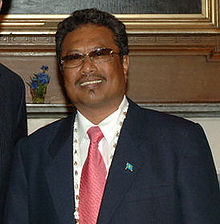Palau's President has proposed banning all commercial fishing in the Pacific nation's waters to create one of the world's largest marine reserves, covering an area roughly the size of France.
 President Tommy RemengesauPalau, 16 March 2013. President Tommy Remengesau, who was elected last November, says a commercial fishing ban could help Palau earn more money from tourism than it currently gets from tuna fleets.
President Tommy RemengesauPalau, 16 March 2013. President Tommy Remengesau, who was elected last November, says a commercial fishing ban could help Palau earn more money from tourism than it currently gets from tuna fleets.
He says his vision is for an area "so well protected" that Palau would become the world's largest marine sanctuary.
"No longer will Palau be merely a shark sanctuary, it will be a sea sanctuary that protects all marine wildlife within Palau's exclusive economic zone (EEZ)," President Remengesau said.
Palau won international acclaim when it created the world's first shark sanctuary in 2009.
Palau's EEZ covers almost 630,000 square kilometres of the northern Pacific, including world-renowned scuba diving and snorkelling sites.
The nation of 300 islands, with a population of about 21,000, has generated negligible revenue from foreign fishing vessels plying its waters.
However, Palau has only one ageing patrol boat and President Remengesau has conceded enforcing any commercial fishing ban will be difficult.
Short-changed
Natural Resources Minister Umiich Sengebau says Palau earns about $5 million a year from the fishing industry, with about $4 million coming from tuna fishing, which is dominated by vessels from Japan and Taiwan.
"The president feels that Palau is short-changed," he said.
He said Palau licensed a total of 129 foreign fishing vessels in 2010 but Pacific island nations received only a fraction of the income generated by tuna captured in their waters.
President Remengesau said the Asian Development Bank estimated the global tuna industry was worth $4 billion a year and only nine per cent went to Pacific nations, where most of the fish are caught.
"Revenue received from commercial fishing licences and taxes from commercial fishing is a drop in the bucket compared to the profits made by large fishing companies," he said.
"An EEZ-wide no commercial fishing zone would mean that only sustenance fishing by Palauan residents and tourism-related sport catch-and-release fishing would be permitted."
He said the proposal was in its early stages and the government would look at alternative revenue sources before implementing it, particularly tourism.
"Some of that revenue will be recovered simply through the increase in tourism that results from the incredible marine biodiversity that will be protected by our sea sanctuary," he said.
Source ABC/AFP